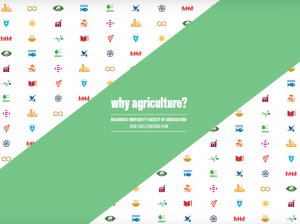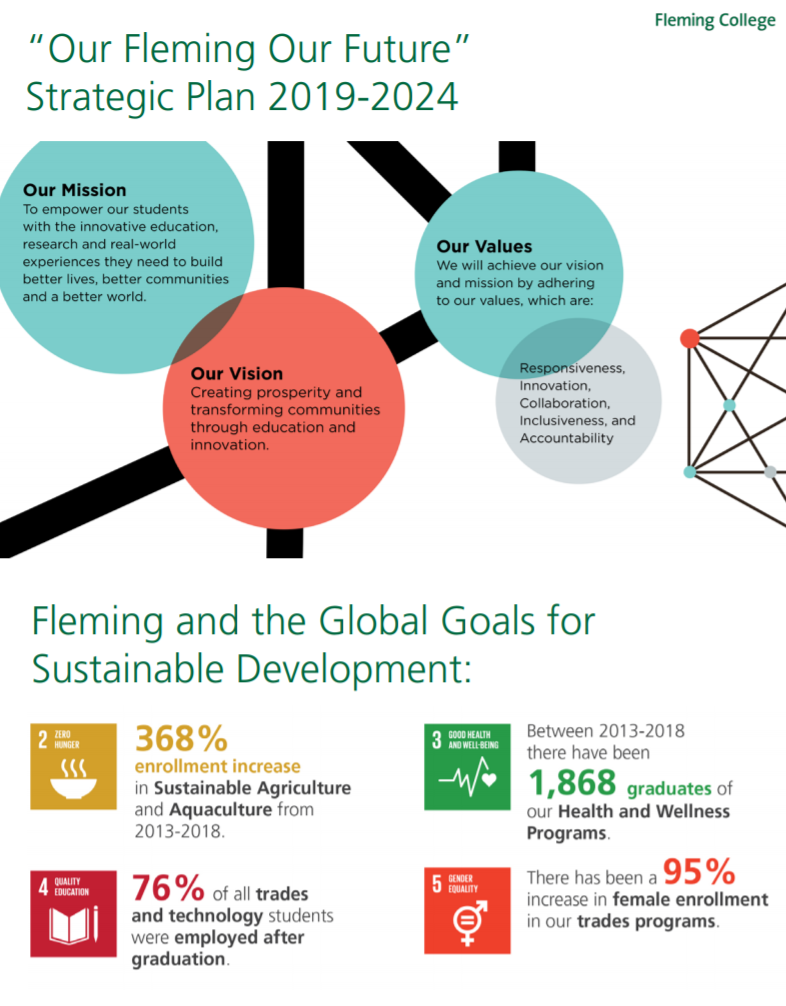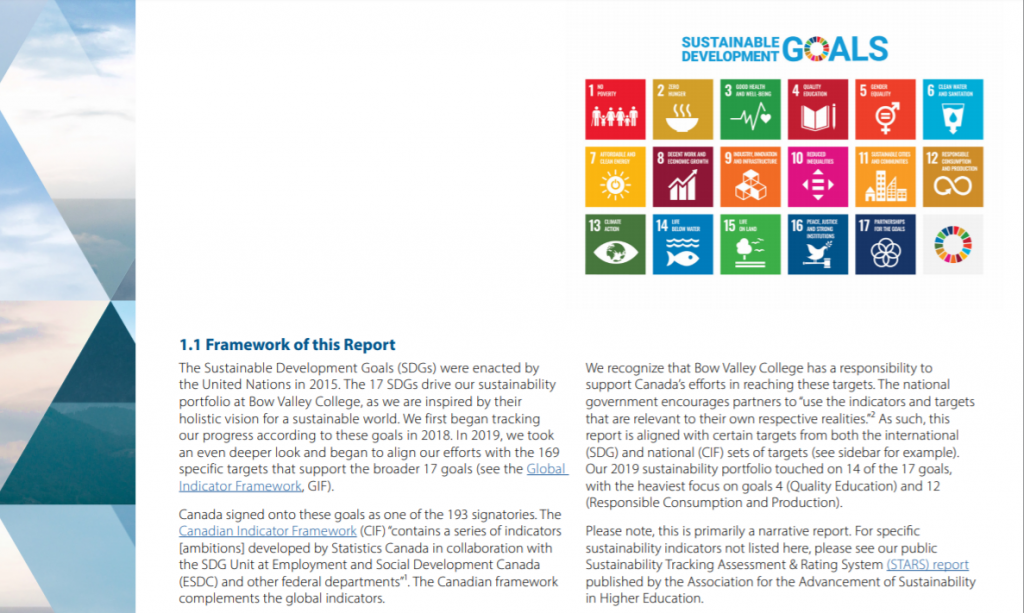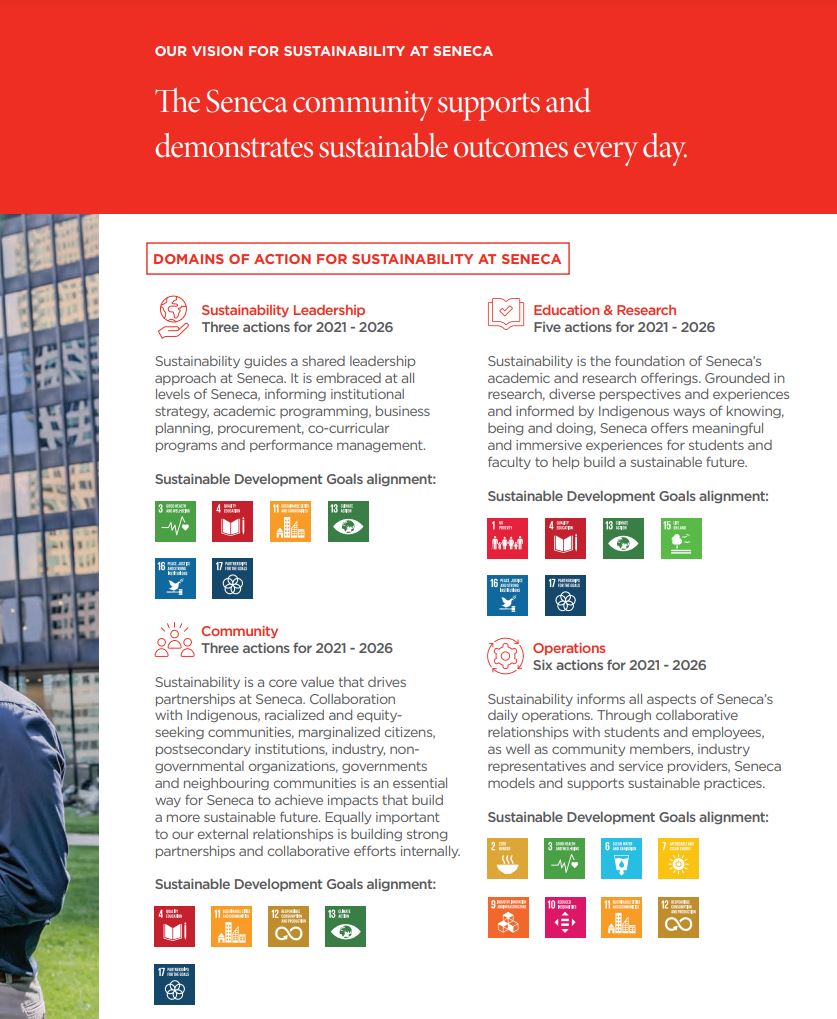1
 ” width=”200″ height=”200″>The Finance and Administration category assesses how institutional planning, procurement, human resources, investment, communications, commercialization, risk management, as well as budgeting and capital planning at a college or institute is aligned to the SDGs.
” width=”200″ height=”200″>The Finance and Administration category assesses how institutional planning, procurement, human resources, investment, communications, commercialization, risk management, as well as budgeting and capital planning at a college or institute is aligned to the SDGs.
Aligning Dalhousie Agriculture Campus’ 2020 Strategic Plan with the SDGs
Dalhousie Agriculture Campus – Truro, Nova Scotia
Project: “Why Agriculture” ” width=”353″ height=”264″>
” width=”353″ height=”264″>
SDGs: All
Project duration: December 1, 2019 – December 31, 2024
Functional Category: Finance and Admin, Student and Community
The Faculty of Agriculture asks, “Why Agriculture?” as it launches its 2020 Strategic Plan. Aligned with the United Nations (UN) Sustainable Development Goals (SDGs), the Faculty is committing its human and physical resources to address the challenges of global and local sustainability in the rapidly changing landscape of the agriculture sector. The five-year plan will also engage youth in solving these challenges. Along with students on the Agricultural Campus, 4-H senior members from across Canada will participate in a Pitch Perfect workshop on the UN SDGs during the national 4-H Members Forum, which will take place between December 2nd and December 4th in Calgary. The Faculty of Agriculture is the sponsor of the Pitch Perfect workshop. Through experiential learning and workshops, members will pitch to a panel of judges what they believe to be the most important SDG.
Stakeholders Involved: Staff members, President/DG of institution (upper management), students, partners, local community
Project Lead: Dr. David Gray, Dean & Campus Principal, david.gray@dal.ca
More info: Why Agriculture
Fleming’s Second Multi-Year Sustainability Plan is Framed by the SDGs
Fleming College – Peterborough, ON
 ” width=”374″ height=”479″>
” width=”374″ height=”479″>
Project: Fleming College Sustainability and Climate Action Plan (2019-2022)
SDGs: All
Project duration: 2019 – 2022
Functional Category: Finance and Admin
In 2019, Fleming College developed its second comprehensive sustainability plan. The 2019 to 2022 Sustainability and Climate Action Plan recognizes the UN SDGs as a guiding framework, along with the UNESCO-UNEVOC framework for post-secondary education, namely, Green Campus, Green Culture, Green Research, Green Curriculum and Green Community. Each section of the plan identifies the key SDGs that are supported by Fleming College’s activities and goals for the 3-year plan. For example, Green Campus aligns with SDGs 6, 7, 8, 9, 12 and 15. The plan also represents Fleming College’s first attempt to capture data that offers a broad representation on how Fleming College supports the SDGs during the previous five years (2013-2018).
Stakeholders Involved: Senior leadership, institutional staff and a broadly representative steering committee of faculty, staff and student leaders.
Project Lead: Contact Tom Phillips, Chief Economic Recovery Officer, sustainability@flemingcollege.ca
More info: Sustainability and Climate Action Plan, Annual Report 2019 – 2020
Aligning Bow Valley College’s Annual Sustainability Report with the Canadian Indicator Framework and 169 targets
Bow Valley College – Calgary, AB
 ” width=”475″ height=”285″>
” width=”475″ height=”285″>
Project: Bow College Annual Sustainability Report
SDGs: All
Project duration: This report covers 12 months of activities at Bow Valley College (2019)
Functional Category: Finance and Admin
This annual sustainability report is Bow Valley College’s (BVC) approach to capturing and communicating the environmental, social, and economic impacts of our daily operations. Through this process, BVC aims to be transparent about the risks and opportunities faced when reducing its environmental impact and enhancing its social and community impacts. The 17 SDGs drive the sustainability portfolio at Bow Valley College, as we are inspired by their holistic vision for a sustainable world. We first began tracking our progress according to these goals in 2018. In 2019, we took an even deeper look and began to align our efforts with the 169 specific targets and the Canadian Indicator Framework.
Stakeholders Involved: Written by the Sustainability Coordinator, with support by the BVC Green Committee and Sustainability Engagement Assistant.
Project Lead: Amy Spark, Sustainability Coordinator, aspark@bowvalleycollege.ca
bvcgreen@bowvalleycollege.ca
More info: Sustainability Report 2019
Nova Scotia Community College engages in sustainability consultations to support the SDGs
Nova Scotia Community College – Nova Scotia
Project: Sustainability Consultations
SDGs: 3, 4, 5, 7, 11, 12, 13, 16, 17
Project duration: May 2020 – July 2020
Functional Category: Finance and Admin
In May and June of 2020, the Nova Scotia Community College Sustainability Team consulted with management teams and facilities management staff at 13 Campuses across Nova Scotia to facilitate a dialogue on how all departments can work together to support the United Nations’ 17 Sustainable Development Goals (SDGs) and how this work relates to NSCC’s strategic vision. We conducted 20 consultation sessions featuring over 200 NSCC employees, which will allow us to distill feedback into common themes and create a sustainability action plan centered on sustainable development. The discussion focused on how the various departments can set measurable goals that ultimately support various SDGs. Institutional partners consisted of Academic Chairs, Campus Principals, Administrative Managers, Facilities Managers, Facilities Staff and Academic Faculty.
Stakeholders Involved: Institution staff, senior leaders/upper management
Project Lead: Mike Chapman, Michael.chapman@nscc.ca

Cambrian College: Further Together 2020-2025
Cambrian College – Ontario
Project: Cambrian College 2020-25: The SDGs and Our Strategic Plan
SDGs: All
Project duration: 2020-25 our Strategic Plan Window
In 2020, as part of consultation on a new strategic plan the issues and ideas of sustainability were repeatedly identified as important considerations for establishing institutional goals.
Cambrian articulated a foundational goal to “create a commitment to environmental sustainability among students, faculty and staff,” a transformational goal to “actively reduce the colleges’ carbon footprint,” and an aspirational goal to “contribute to advancing the United Nations 2030 Sustainable Development Goals in College operations and academic programming.” The goals will inform strategies and the implementation of initiatives throughout the five-year period of the plan and look forward to the many ways students, staff, and external partners will engage with Cambrian on these critical global issues.
Sustainability was specifically named as Objective 7 of the Further Together 2020-2025 strategic plan as Promote a sustainable campus. The paired statement that accompanies this objective was as follows:
Informed environmental stewardship is more than a sound strategy. It is a human imperative. At Cambrian, we are committed to going beyond expectations and considering the environment in every aspect of our work, from straightforward tactics like electricity management and waste diversion, to targeted programs, learning strategies and curriculum outcomes.
Stakeholders Involved: institutional staff, students, senior leadership and external partners
Project Lead: Melanie Cacciotti, President’s Office and Liaison to the Board of Governors, melanie.cacciotti@cambriancollege.ca,

Seneca College – Toronto, ON Project Name: Our Path Forward – Seneca Sustainability Plan 2021-2026 SDGs: All Project duration: September 2021 to September 2026 Functional Category: Academic Seneca has launched its inaugural sustainability plan to chart the course on how to build a more sustainable postsecondary institution. While Seneca has already been focused on sustainability issues, the move to create a formal plan outlining our objectives came as the result of a review on how to become a stronger and renewed institution following the pandemic. During this review, sustainability emerged as a key pillar that the Seneca community wanted to see prioritized. Seneca worked with consulting firm, Intelligent Futures, to develop the plan. Input was sought from across the institution including students and employees to set sustainability goals and priorities. Seneca’s approach will focus on themes of Leadership, Community, Education & Research and Operations. Seneca’s reach is global and we are committed to contributing to the 17 Sustainable Development Goals (SDGs) developed by the United Nations. Throughout Our Path Forward, the alignment between SDGs and the actions Seneca will take are identified. The Sustainability Tracking Assessment Rating System (STARS) reporting system is another tool that will be used to guide us in reaching our sustainability goals over the next five years. Stakeholders Involved: Seneca students and employees including senior leaders Project Lead: The Office of the VP, Finance and Administration sustainableseneca@senecacollege.ca More info: Sustainable Seneca, Seneca Sustainability Plan

